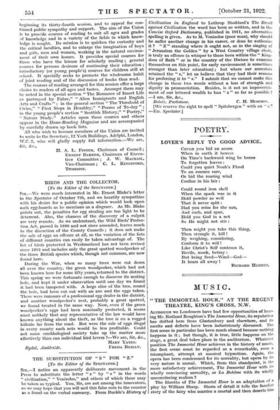BIRDS AND THE COLLECTOR.
[To the Editor of the SPECTATOR.] Stn,—We were much interested in Mr. Ernest Blake's letter in the Spectator of October 7th, and we heartily sympathize with his desire for a public opinion -which would look upon such egg-hoards as he mentions as a disgrace. As Mr. Blake points out, the penalties for egg stealing are too light to be deterrent. Also, the chances of the discovery of a culprit are very remote. As we understand, the Wild Birds' Protec- tion Act, passed in 1880 and not since amended, leaves much to the discretion of the County Councils ; it does not make the sale of eggs an offence at all, so the variation of the lists .of different counties can easily be taken advantage of. The list of birds protected in Westmorland has not been revised since 1913 and includes only the great spotted woodpecker of the three British species which, though not common, are now found here.
During the War, when so many trees were cut down all over the country, the green woodpecker, which had not' been known here for some fifty years, returned to the district. This spring we were fortunate enough to discover its nesting hole, and kept it under observation until one day we found it had been tampered with. A large slice of the tree, round the hole, had been cut out with an axe and the eggs taken. There were rumours of a professional egg dealer in the district, and another woodpecker's nest, probably a great spotted, we found treated in the same way. Now, even if the green woodpecker's eggs had been nominally protected, it seems most unlikely that any representative of the law would have known anything about the theft, as the tree is on a rugged hillside far from the road. But were the sale of eggs illegal in every county such acts would be less profitable. Could not some ornithological society take up the matter more effectively than can individual bird lovers ?—We are, Sir, &c.,
MARY YATES.


































































 Previous page
Previous page